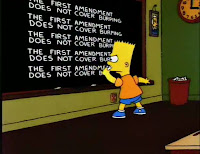 with a Kindle. As teachers we are constantly trying to reshape the way we approach the way these students learn in a shifting environment.
with a Kindle. As teachers we are constantly trying to reshape the way we approach the way these students learn in a shifting environment.This short video made me think about the future. I am interested to see what lies ahead for us as individuals and as a nation. It brought up some interesting points about the changing technology and the simple fact that new technology moves faster than the educational system that teaches students to use it. When I think of my students and the difficulties that lie ahead of them in high school and then college, I believe the challenge for their teachers and professors is to teach in a way that makes them think creatively. Anyone can study, memorize and repeat but the upcoming generation of students are entering an environment that moves so quickly they need to be equipped to change as the technology develops around them. So learning HOW to think about situations and technologies may be a skill that needs to be focused on in this changing environment.
In undergrad I was always struck by the kinds of students who were smarter than me in class and often did better on tests but who had little to no people or critical thinking skills. Their educational world has developed in such a box that when the real and shifting world hits them, they will be unable to follow. In a system of technology that becomes faster and a world that grows in its connectedness in unique ways, we must teach a future of individuals who are able to get outside of the box that is traditional learning and be able to flex along with the moving world around us.
















